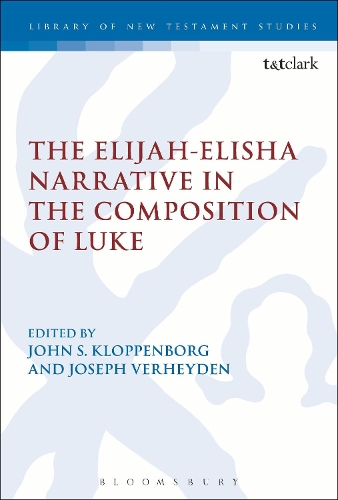
The Elijah-Elisha Narrative in the Composition of Luke
(Hardback)
Available Formats
Publishing Details
The Elijah-Elisha Narrative in the Composition of Luke
By (Author) Professor John S. Kloppenborg
Edited by Joseph Verheyden
Bloomsbury Publishing PLC
T.& T.Clark Ltd
7th November 2013
United Kingdom
Classifications
General
Non Fiction
Criticism and exegesis of sacred texts
New Testaments
226.406
Physical Properties
Hardback
184
Width 156mm, Height 234mm
440g
Description
This collection examines the allusions to the Elijah- Elisha narrative in the gospel of Luke. The volume presents the case for a maximalist view, which holds that the Elijah-Elisha narrative had a dominant role in the composition of Luke 7 and 9, put forward by Thomas L. Brodie and John Shelton, with critical responses to this thesis by Robert Derrenbacker, Alex Damm, F. Gerald Downing, David Peabody, Dennis MacDonald and Joseph Verheyden. Taken together the contributions to this volume provide fascinating insights into the composition of the gospel of Luke, and the editorial processes involved in its creation. Contributions cover different approaches to the text, including issues of intertextuality and rhetorical-critical examinations. The distinguished contributors and fast-paced debate make this book an indispensable addition to any theological library.
Reviews
This collection of essays from prominent North American and European scholars offers a much-needed critical discussion of Lukes use of the Elijah-Elisha narrative (1 Kings 16:292 Kings 13) Because it includes a diverse collection of scholarly reflections on the extent of Lukes use of the Elijah-Elisha narrative, this volume both offers well-reasoned points and counterpoints within which future studies can situate themselves and also suggests potential avenues for fruitful investigation -- Michael Kochenash, Claremont School of Theology * Religious Studies Review *
Author Bio
John S. Kloppenborg is Professor of Religion at the University of Toronto, Canada. He is well-known for his ground-breaking work on the Sayings Gospel Q. His most recent publication is Excavating Q: The History and Setting of the Sayings Gospel. He is currently writing a commentary on James for the Hermeneia series. Joseph Verheyden is Professor of New Testament Studies at the University of Leuven, Belgium. He has recently edited The Figure of Solomon in Jewish, Christian and Islamic Tradition: King, Sage and Architect (2013) and (with J.W. van Henten), Early Christian Ethics in Interaction with Jewish and Greco-Roman Contexts (2013).
